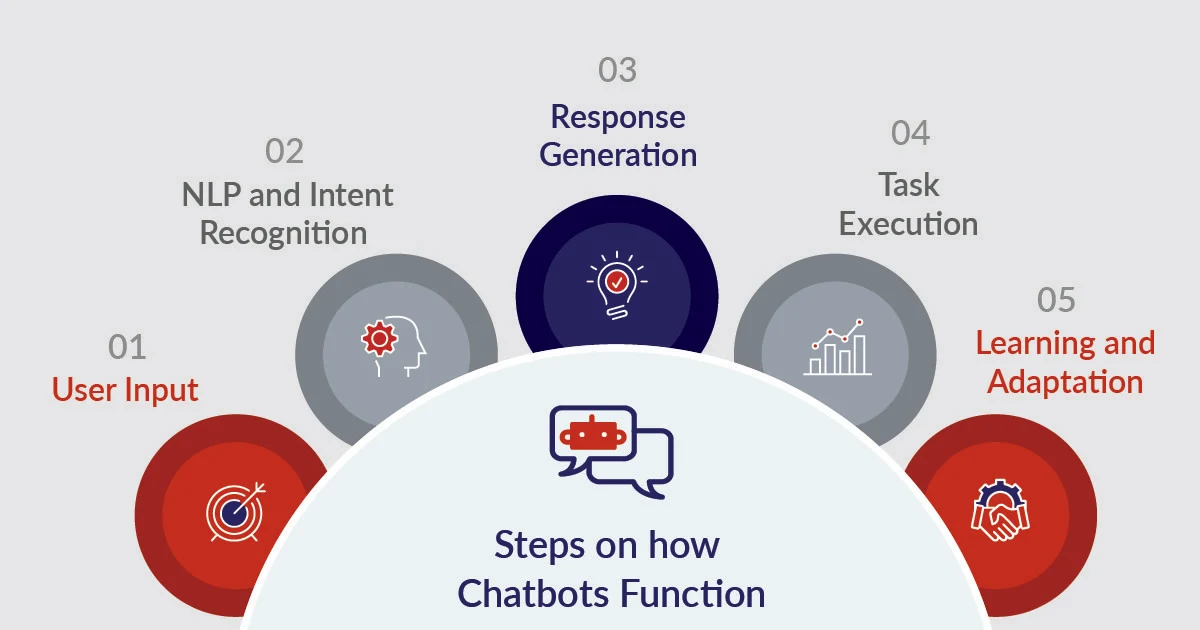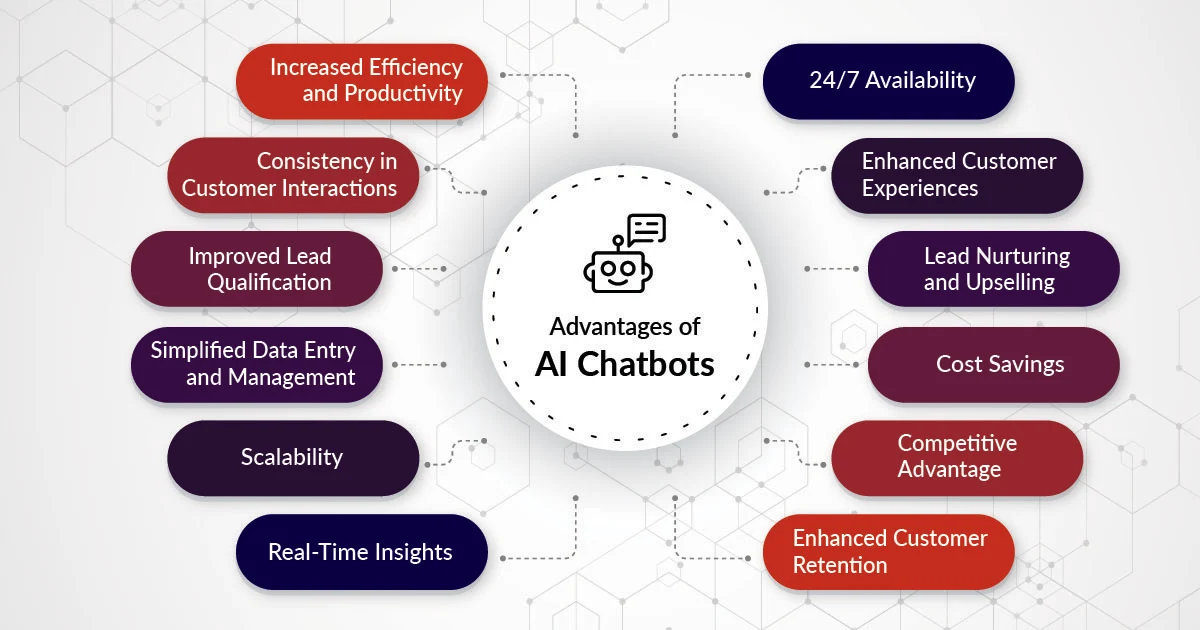Quick Links
- Understanding AI Chatbots
- How Chatbots Function
- Enhancing Customer Service with AI Chatbots
- Streamlining Sales Processes
- Data Entry and Management
- Benefits of AI customer service Chatbots in Salesforce Automation
- Integrating AI Chatbots into Salesforce
- Challenges and Opportunities of AI Chatbots in Salesforce
- Conclusion
The Role of AI Chatbots in Salesforce Automation

The way organizations handle their sales, customer support, and marketing activities has been changed by Salesforce, which is now more than just (CRM) software. To simplify these procedures and enhance client interactions, it offers a wide variety of tools and functionalities.
The incorporation of AI chatbots into Salesforce is one of the most recent advancements in the field of CRM. This article will examine the substantial contribution that AI chatbots provide to the automation of many Salesforce features.
Understanding AI chatbots is crucial before exploring their function in Salesforce automation. Artificial intelligence (AI) chatbots are software programs that analyze natural language (NLP) and artificial intelligence (AI) to comprehend and reply to human language. They can communicate with users by text or speech and give them information, support, or direction.
How Chatbots Function
Natural language processing (NLP), machine learning, and established rules all work together to make chatbots work. The following is a breakdown of how they operate:

User Input:
Consumers frequently begin a conversation with a chatbot by sending a message or posing a query using a chat interface on a website, messaging app, or other communication channels.NLP and Intent Recognition:
The chatbot can recognize the user's intent and gather important data from input via natural language processing technologies. It examines the text to determine what the user is asking or requesting.Response Generation:
The chatbot generates the appropriate response based on the user's input and intent. Depending on the platform and design, this response could take the shape of text, speech, or even visual components like buttons or cards.Task Execution:
Chatbots can perform a wide range of tasks, from answering frequently asked questions, providing recommendations, processing orders, or routing inquiries to human agents.Learning and Adaptation:
AI-powered chatbots continually learn from interactions and improve their responses over time. They can adapt to changing user preferences and conversation patterns.
Enhancing Customer Service with AI Chatbots
One of the primary functions of AI chatbots in Salesforce is improving customer service. Traditionally, customer service involved human agents who would handle inquiries, resolve issues, and provide support. However, with the integration of AI chatbots, many routine customers service tasks can be automated.
24/7 Availability:
AI chatbots can operate round the clock, ensuring that customers can get assistance or answers to their questions at any time, even outside regular business hours. This is especially valuable for businesses with a global customer base.Quick Responses:
Chatbots can provide instant responses to common customer queries. This not only improves customer satisfaction but also reduces the workload on human customer service agents, allowing them to focus on more complex issues.Consistency:
Chatbots provide consistent and standardized responses, ensuring that all customers receive the same level of service and information. This consistency helps in maintaining the brand's image and reliability.Information Retrieval:
AI chatbots can quickly retrieve customer information and transaction history from the Salesforce database, allowing for personalized interactions. This personalization can lead to better customer experiences.
Streamlining Sales Processes
Salesforce is, of course, well known for its capabilities in sales automation. AI chatbots can enhance these features by automating various aspects of the sales process.
Lead Qualification:
Chatbots can engage with potential leads, asking qualifying questions to determine their suitability. This helps sales teams prioritize and focus on leads that are more likely to convert into customers.Lead Nurturing:
Chatbots can engage in lead nurturing by sending automated follow-up messages, providing information, and even scheduling appointments or product demonstrations.Order Processing:
For e-commerce businesses using Salesforce, chatbots can assist in order processing. They can help customers place orders, track shipments, and answer questions about product availability.Cross-Selling and Upselling:
Chatbots can recommend complementary products or upgrades based on the customer's preferences and purchase history, contributing to increased sales revenue.
Data Entry and Management
Salesforce relies heavily on data entry and management. AI chatbots can significantly simplify these processes.
Data Entry Automation:
Chatbots can assist in data entry by populating fields with information gathered during customer interactions. For example, after a support conversation, a chatbot can update the customer's contact record with relevant details.Data Cleansing:
Chatbots can help maintain data accuracy by verifying and cleaning up records. They can identify and correct inconsistencies or errors in contact information.Data Analysis:
Advanced chatbots equipped with analytics capabilities can analyze data trends, providing insights that can be used to make informed business decisions.
Let’s look into the overall advantages that AI Chatbots bring in the journey of Salesforce Automation.
Benefits of AI customer service Chatbots in Salesforce Automation
In addition to the significant role AI chatbots play in Salesforce automation, it's essential to highlight the numerous benefits they bring to the table. These benefits are instrumental in improving business operations, enhancing customer experiences, and driving growth.

Increased Efficiency and Productivity
AI chatbots in Salesforce can handle a multitude of routine and repetitive tasks, such as answering frequently asked questions or processing orders. By reducing the burden on human agents and freeing them up to work on more challenging and valuable jobs, this automation dramatically increases efficiency. Businesses are able to serve more clients in less time as a result, thus boosting productivity.
24/7 Availability
One of the standout advantages of AI chatbots is their ability to operate around the clock. Unlike human agents, chatbots don't require rest or breaks, ensuring that customers can receive assistance or information at any time, including outside regular business hours. This 24/7 availability caters to a global customer base and demonstrates a commitment to customer service.
Consistency in Customer Interactions
AI chatbots provide consistent and standardized responses to customer inquiries. This ensures that customers who contact the company at whatever time of day will all receive the same level of service and information. The brand's reputation and dependability depend on maintaining consistency, which is crucial in today's competitive business market.
Enhanced Customer Experiences
With AI chatbots, customers can receive quick and accurate responses to their queries. These chatbots can be programmed to understand natural language and offer personalized responses. The ability to retrieve customer information and transaction history from the Salesforce database enables chatbots to engage in personalized interactions, providing an elevated level of service and enhancing overall customer experiences.
Improved Lead Qualification
In the realm of sales automation, AI chatbots can be invaluable for lead qualification. They can engage potential leads and ask qualifying questions to determine their suitability. This automated process helps sales teams prioritize and focus on leads that have a higher likelihood of converting into customers, ultimately improving sales efficiency and outcomes.
Lead Nurturing and Upselling
Chatbots are not limited to basic inquiries. They can engage in lead nurturing by sending follow-up messages, providing information, and even scheduling appointments or product demonstrations. Moreover, chatbots can be programmed to recommend complementary products or upsells based on the customer's preferences and purchase history, leading to increased sales revenue.
Simplified Data Entry and Management
Salesforce relies on accurate and up-to-date data. AI chatbots can significantly simplify data entry and management. They can assist in populating fields with information gathered during customer interactions, reducing the risk of data entry errors. Additionally, they can verify and clean up records, maintaining data accuracy. Some advanced chatbots are equipped with data analytics capabilities, which can provide insights that help businesses make informed decisions.
Cost Savings
By automating routine tasks, AI chatbots can lead to substantial cost savings. Businesses can lower the number of human agents needed to complete jobs like data input, lead validation, and customer service. This lowers labor expenses and enables businesses to manage resources more effectively.
Scalability
AI chatbots are highly scalable. They can handle an increasing volume of customer interactions without a proportional increase in costs. This scalability is particularly advantageous for businesses experiencing growth or fluctuations in customer demand.
Competitive Advantage
Adopting AI chatbots in Salesforce automation gives businesses a competitive edge. It shows a dedication to innovation and enhancing consumer experiences, which can distinguish a business in a crowded industry. Additionally, in a highly competitive economy, the capacity to offer 24/7 support and individualized interactions can draw in and keep consumers.
Real-Time Insights
Real-time information about client interactions and preferences can be obtained using AI chatbots. Making informed decisions, improving marketing tactics, and identifying opportunities for growth in the customer service and sales processes can all be done with the help of this data.
Enhanced Customer Retention
The personalized nature of AI chatbot interactions can lead to improved customer retention. Customers are more inclined to stick with a company that respects their demands and offers excellent customer service.
Integrating AI Chatbots into Salesforce
To leverage the benefits of AI chatbots in Salesforce automation, it's essential to integrate them effectively. Salesforce provides a range of tools and APIs that make this integration relatively straightforward.
Einstein Bots
Salesforce offers a feature called Einstein Bots, which allows businesses to create and deploy chatbots within their Salesforce environment. These bots can be customized to meet specific business needs and seamlessly integrated with other Salesforce tools.
API Integration
For more advanced and custom chatbot solutions, Salesforce offers APIs that allow for direct integration with external chatbot platforms. This approach provides greater flexibility and control over the chatbot's behavior.
Training and Monitoring
It's essential to train the chatbot to comprehend your business procedures and client interactions after integration. To guarantee that the chatbot continues to function successfully, regular monitoring and fine-tuning are also essential.
Challenges and Opportunities of AI Chatbots in Salesforce
While AI chatbots offer significant benefits, they also come with some challenges, especially in the context of Salesforce automation.
User Acceptance
Not all customers readily accept AI chatbots as a replacement for human interaction. Some customers may prefer the personalized touch that a human agent provides. It's essential to strike the correct balance between automation and human interaction. Businesses can consider about giving customers to choose between automated and human-assisted interactions, depending on their preferred method of interaction.
Data Privacy and Security
Managing and safeguarding customer data is a significant responsibility for businesses. The privacy and security of sensitive information must be guaranteed when AI chatbots are handling client interactions. Chatbots must uphold strict security standards and comply with data protection laws, such as GDPR or HIPAA, depending on the industry. Encryption, access controls, and data anonymization are all critical components of ensuring data security.
Complex Interactions
AI chatbots excel at handling routine and straightforward inquiries, but they may struggle with complex or emotionally charged customer interactions. Businesses must have a mechanism in place for seamlessly transferring such interactions to human agents. Ensuring a smooth handover process is vital to maintain customer satisfaction and resolve intricate issues effectively.
Discover how AI can transform your business
Get in touch with us to know more!
Conclusion
AI chatbots have emerged as powerful tools for automating various aspects of Salesforce. They improve customer service, accelerate sales, and make data administration easier. They can considerably increase efficiency, enhance client experiences, and contribute to the overall success of a firm when properly integrated.
AI chatbots will play a bigger part in Salesforce automation as technology develops, which will be advantageous for companies trying to stay competitive in a market that is changing quickly. Embracing this technology and continuously refining chatbot interactions can lead to improved customer engagement, increased sales, and enhanced data management within the Salesforce ecosystem.
In conclusion, the role of AI chatbots in Salesforce automation is not just a trend but a transformative force that will shape the future of CRM.